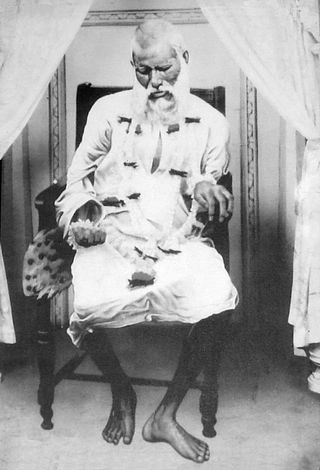
A tariqa is a school or order of Sufism, or specifically a concept for the mystical teaching and spiritual practices of such an order with the aim of seeking haqiqa, which translates as "ultimate truth".

The Chishtī Order is a tariqa, an order or school within the mystic Sufi tradition of Sunni Islam. The Chishti Order is known for its emphasis on love, tolerance, and openness. It began with Abu Ishaq Shami in Chisht, a small town near Herat, Afghanistan about 930 AD.

Muhammad Nizamuddin Auliya, also known as Hazrat Nizamuddin, and Mahbub-e-Ilahi was an Indian Sunni Muslim scholar, Sufi saint of the Chishti Order, and is one of the most famous Sufis from the Indian Subcontinent. His predecessors were Fariduddin Ganjshakar, Qutbuddin Bakhtiyar Kaki, and Moinuddin Chishti, who were the masters of the Chishti spiritual chain or silsila in the Indian subcontinent.

The Qadiriyya are members of the Sunni Qadiri tariqa. The tariqa got its name from Abdul Qadir Gilani, who was a Hanbali scholar from Gilan, Iran. The order relies strongly upon adherence to the fundamentals of Sunni Islamic law.

Farīd al-Dīn Masʿūd Ganj-i-Shakar was a 13th-century Punjabi Sunni Muslim preacher and mystic, who was one of the most revered and distinguished Muslim mystics of the medieval period. He is known reverentially as Bābā Farīd or Shaikh Farīd by Muslims, Hindus and Sikhs of the Punjab Region, or simply as Farīduddīn Ganjshakar.

Qalandar in Sufism is used as a title for some Sufi saints. Some people for whom the title is used are Lal Shahbaz Qalandar, Bu Ali Shah Qalandar, Shams Ali Qalandar, Rabia Basri, Nathar tabre Aalam qalandar, Baba Fakruddin qalandar and Qalandar Baba Auliya. Makhdom Mehmood Mastwar Qalander **Qalandar Ishfaq Muree*
The city of Multan, Punjab, Pakistan has many mausoleums and shrines, due to its rich heritage of pirs and saints. Some of the best-known mausoleums that can still be visited today include the following.

Usman Harooni was an early modern wali or Sufi saint of Islam in India, a successor to Shareef Zandani, sixteenth link in the Silsila of the Chishti order, and master of Moinuddin Chishti. Usman Harooni was born in Haroon, Iran. His year of birth is variously given as 1096, 1116 and 1131 AD. He is also known by the nicknames Abu Noor and Abu Mansur.

Maudood Chishti was an early day Sufi Saint, a successor to his father and master Abu Yusuf Bin Saamaan, twelfth link in the Sufi silsilah of Chishti Order, and the Master of Shareef Zandani. He was born around 430 Hijri in the city of Chisht. He initially received education from his father. He memorized the Qur'an by age 7 and completed his education when he was 16. His work includes two books, Minhaaj ul Arifeen and Khulaasat ul Shariah. He died in the month of Rajab at the age of 97 in 533 AH. He was buried at Chisht like many of the early Chishtiyya.
Qalandar Baba Auliya is the title of the Sufi Scholar and Mystic Muhammad Azeem Barkhiyya, the founder of the Azeemia order of Sufis. He was given the honorifics Abdal-i-Haq and Hasn-e-Ukhra.

Sheikh Jamal-ud-Din Ahmad was a direct descendant of Imam Abu Hanifa, the renowned Sunni-Persian jurist of Islam. He was born at Ghazni, (Khorasan) which is in Modern-day Afghanistan, in 583 A.H.. He was five years old when his family came to Hansi. He became a disciple of Baba Fariduddin Ganjshakar at the age of 50. He learnt deeply and served devotedly.

Sheikh Noor ul Mashaikh Sayyid Ahamed Muhyudheen NooriShah Jeelani Arabic:, known more commonly as NooriShah Jeelani, was a renowned 20th-century muslim, sufi, wali, mystic, orator, faqeeh, theologian, mujaddid and highly acclaimed Islamic scholar of the Qadri, Chisti order from the Indian sub continent. He was the 21st grand son of the famous Sufi saint Ghous-e-Azam Sheikh Mohiyudheen Abdul Qadir Jilani of Baghdad. He was also widely known by his title Noor-ul-Mashaikh. He was the Eponymous founder of the Silsila-e-Nooriya tariqa which is a sub-branch of Qadiriyya and Chistiyya in India.
Shihab al-Din may refer to:
Shah Deccan Qutub Kokan Khwaja Pir Hafiz Habib Ali Shah was born in a Sufi family, whose lineage is traced back to Abu Bakr, the first Caliph of Islam, his ancestors were Sufi masters. From Syedna Abu Bakr Siddiq, the forefathers of Pir Khaja Habib Ali Shah حضرت حبئب علی شاہ obtained the spiritual education (Tassawuf/Tariqat) and bestowed with Caliphat from their fathers

Tajuddin Muhammad Badruddin, also known as Tajuddin Baba, was an Indian Sufi master who is considered as the Qutb. His shrine is in Nagpur, India.
Khawaja Shamsuddin Azeemi is a Pakistani scholar in the field of spiritualism and a Sufi master. He is the current head of the Azeemia Sufi order. He has written books on the subject of spirituality or Muraqaba and is the chief editor of the monthly Roohani Digest and Qalander Shaoor in Karachi, Pakistan. Moreover, he has established a chain of fifty-three meditation halls worldwide.

Khwāja Mumshād ʿUlū Ad-Dīnawarī, also known as Karīm ad-Dīn Munʿim, was a prominent Sufi of the 9th century. He was born in Dinavar, Iranian Kurdistan present day Iran province. He was disciple of Abu Hubayra al-Basri in Chishti Order and Junayd of Baghdad as well.
Sayyid Kastir Gul (1573-1653) also known as Sheikh Al-Mashaikh Sheikh Rahmakar alias Kaka Sahib, was an Islamic jurist and Sufi saint of the 16th and 17th centuries who is still highly revered among Afghans and Pakistanis. He is the patriarch of the Pashtun Kakakhel tribe, which is distinguished from other Pashtun tribes by its descendants to the Prophet Muhammad.









